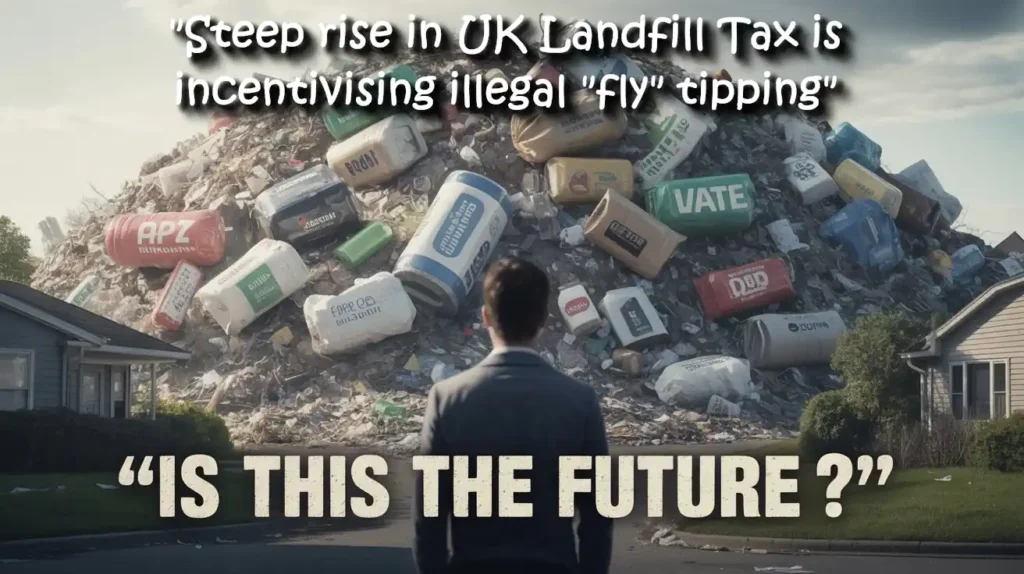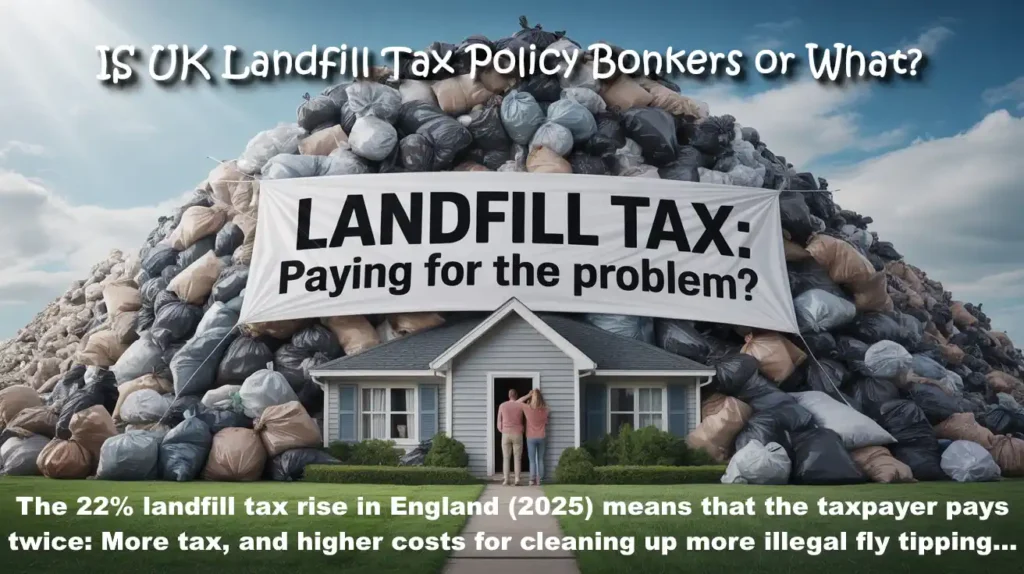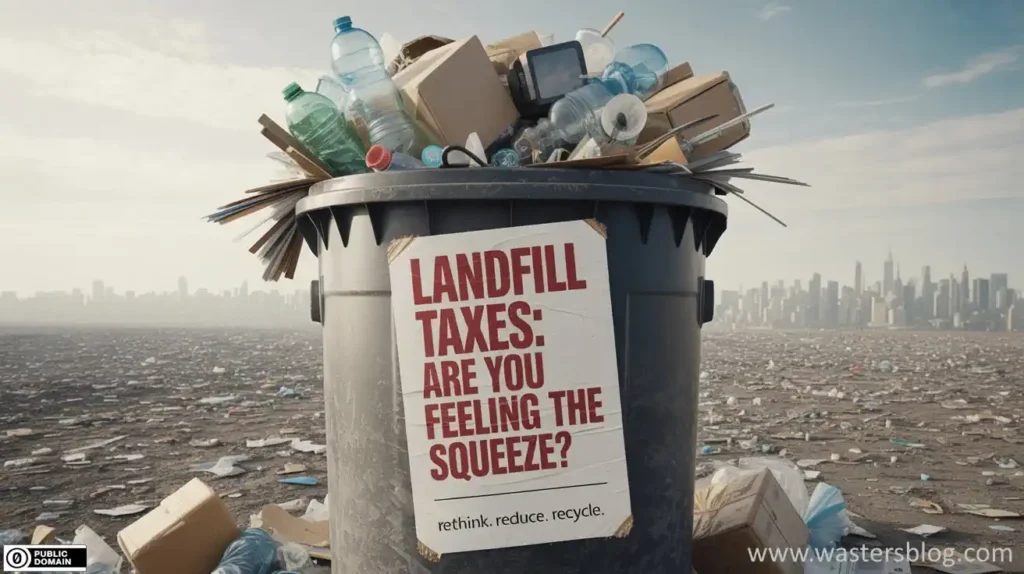UK Landfill Tax (England and Wales) now exceeds £8 per Wheelie Bin: We explain the hidden cost Burden on Council Tax payers in 2025.
Introduction: A Tax That Has Nearly Doubled in a Decade
The UK's Landfill Tax has reached unprecedented levels in 2025, creating a significant hidden burden on English households through their council tax bills. The standard rate of landfill tax is now £126.15 per tonne, representing a staggering increase from the £80 per tonne rate that was already causing concern back in 2014. This dramatic rise means that the average English family is now paying over £8 per wheelie bin in landfill tax – more than 60% higher than the £5.20 per bin cost that sparked debate a decade ago.
What makes this increase particularly concerning is that household recycling rates have plateaued at around 43-44% in recent years, suggesting that the tax's original environmental purpose – incentivising waste diversion from landfill – may have reached its limits. Yet the government continues to raise the tax rate annually, ostensibly for environmental reasons, while effectively creating what many argue is a stealth tax on local authorities and, ultimately, council tax payers.
The timing is particularly problematic given the ongoing cost-of-living pressures facing UK households and the financial constraints on local authorities. While the government frames these increases as necessary environmental measures, the reality is that much of the waste now going to landfills represents residual waste that cannot easily be diverted through the current recycling infrastructure.

Current Cost Impact: Over £8 Per Wheelie Bin in 2025
The Mathematics of the Modern Landfill Tax Burden
From 1 April 2025, the standard rate of landfill tax increased to £126.15 per tonne – a 22% increase from the previous year. Using the same calculation methodology that revealed the £5.20 per bin cost in 2014, we can now determine the true impact on English households in 2025.
The Current Calculation:
- Average 1100-litre wheelie bin weight: approximately 65kg (unchanged from 2014)
- Current landfill tax rate: £126.15 per tonne (2025)
- Cost per bin if all waste goes to landfill: £8.20 per bin
Impact on Households with Current Recycling Rates: With the UK recycling rate for household waste at 44.1% in 2022, approximately 56% of household waste still requires disposal. For a typical fortnightly collection system:
- Residual waste per bin: £8.20 × 0.56 = £4.59 per fortnight
- Annual cost per household: 26 collections × £4.59 = £119.34 per year
This represents a 53% increase from the £78 per year calculated in 2014, despite recycling rates having improved only marginally from the 40% assumed in the original calculation.
Regional Variations and Additional Costs
The burden varies significantly across England depending on local recycling performance and collection frequency. Areas with lower recycling rates face proportionally higher landfill tax costs, while authorities with weekly collections see the annual burden increase accordingly.
For local authorities, this represents a substantial drain on resources that could otherwise fund essential services. A typical local authority serving 100,000 households now faces an annual landfill tax bill exceeding £11.9 million – money that is collected locally through council tax but sent directly to the Treasury.

The Historical Context: How We Reached This Point
The Landfill Tax was introduced in 1996 by the Treasury as an environmental tax designed to reduce waste going to landfill. Initially set at modest levels, the tax has increased every year since 1999, with particularly steep rises implemented during the 2000s and 2010s.
The original justification focused on meeting EU waste diversion targets and encouraging the development of recycling infrastructure. However, the tax has continued to rise well beyond the point where it achieves meaningful additional environmental benefits. The 22% increase implemented in 2025 suggests the government views this primarily as a revenue-raising measure rather than an environmental incentive.
During the period from 2008 to 2014, when the tax rose from around £30 to £80 per tonne, there was indeed significant diversion of waste from landfill. However, the rate of improvement has slowed considerably, indicating that further tax increases are unlikely to drive substantial additional environmental benefits.
The Stealth Tax Reality
What has emerged is effectively a stealth tax on English households, collected through local council tax bills but benefiting central government coffers. The mechanism is particularly insidious because:
- Hidden from taxpayers: Most council tax payers are unaware that over £119 of their annual bill goes directly to the Treasury via landfill tax
- Unavoidable for many: Much of the remaining waste cannot be easily diverted, given current infrastructure limitations
- Regressive impact: The tax hits all households equally, regardless of income, making it particularly burdensome for lower-income families
- Local service cuts: Money that could fund libraries, social services, and other local amenities instead flows to the central government
The Environmental Diminishing Returns
While the government has set targets for 55% municipal waste recycling by 2025 and 65% by 2035, the current recycling infrastructure and household behaviour patterns suggest these targets may be challenging to achieve through tax increases alone.
The waste still going to landfills increasingly consists of materials that are difficult to recycle with current technology or infrastructure. Continuing to raise the landfill tax on this residual waste stream generates revenue but provides minimal additional environmental benefit.
The Unintended Consequence: Fueling the Fly-Tipping Crisis
One of the most damaging side effects of escalating landfill tax rates has been the dramatic increase in illegal fly-tipping across England's countryside and urban areas. As legitimate waste disposal becomes increasingly expensive, a growing number of individuals and businesses are turning to illegal dumping as an alternative, undermining both the environmental goals of the tax and its revenue-generating potential.
The Scale of the Problem
The statistics reveal a clear correlation between rising landfill tax rates and increasing fly-tipping incidents. Local authorities in England dealt with 1.15 million fly-tipping incidents in 2023/24, representing a 6% increase from the 1.08 million reported in 2022/23. Even more concerning, this means an average of 3,157 instances of fly-tipping are reported each day in England – that's once every 27 seconds.
Over a five-year period from 2018/19 to 2023/24, fly-tipping incidents increased by 20.4% – a period that coincides with substantial increases in landfill tax rates. Particularly notable is that 60% of fly-tips involved household waste, suggesting that ordinary families and small businesses are increasingly resorting to illegal disposal methods to avoid the high costs embedded in legitimate waste services.

The Financial Cost to Public Services
The irony is stark: while the government collects increased landfill tax revenue, local authorities are simultaneously spending vast sums dealing with the illegal dumping this tax increase encourages. The cost of clearing large fly-tipping incidents alone reached £13.1 million in 2023/24, but this represents only the tip of the iceberg.
When including investigation and enforcement costs, the estimated total cost of fly-tipping to the public in 2024 was £84 million. This means that for every pound the Treasury gains from landfill tax increases, local authorities and ultimately taxpayers are spending significant additional amounts cleaning up the resulting illegal dumping.
The enforcement burden is enormous: local authorities carried out 528,000 enforcement actions in 2023/24, diverting resources from other essential services. Each incident requires investigation, clearance, and often lengthy legal proceedings – all funded by the same council tax payers who are already bearing the cost of the landfill tax.
Diminishing Returns for the Treasury
The government's expectation of increased revenue from landfill tax rises is being undermined by the very behaviour these increases encourage. As more waste is illegally dumped rather than processed through legitimate channels, the actual tonnage subject to landfill tax decreases. This creates a vicious cycle where:
- Higher landfill tax rates encourage illegal dumping
- Less waste enters the legitimate waste stream
- Lower actual landfill tax receipts than projected
- The government considers further tax increases to meet revenue targets
- More illegal dumping results
Environmental Damage Beyond the Tax's Intent
The environmental impact of fly-tipping often exceeds the environmental damage that would result from legitimate landfill disposal. Illegally dumped waste:
- Contaminates waterways and soil without proper environmental controls
- Harms wildlife and ecosystems
- Often includes hazardous materials dumped without safety precautions
- Requires additional vehicle movements for clearance, increasing carbon emissions
- Damages the countryside and urban environments that environmental policy should protect
The Perverse Incentive Structure
The current system creates perverse incentives where the most environmentally damaging disposal method (illegal dumping) becomes financially attractive due to the high cost of legitimate disposal. A household facing a £119 annual landfill tax burden through their council tax, combined with high local waste disposal charges, may view illegal dumping as their only affordable option.
This is particularly problematic for:
- Small businesses facing commercial waste disposal costs
- Households undertaking home improvements or clearances
- Rural communities with limited waste collection services
- Low-income families unable to afford legitimate disposal options
The result is that the landfill tax, originally designed to protect the environment, is now actively encouraging more environmentally damaging behaviour while imposing significant costs on the very local authorities it claims to support through environmental improvements.

The Environmental Diminishing Returns
While the government has set targets for 55% municipal waste recycling by 2025 and 65% by 2035, the current recycling infrastructure and household behaviour patterns suggest these targets may be challenging to achieve through tax increases alone.
The waste still going to landfills increasingly consists of materials that are difficult to recycle with current technology or infrastructure. Continuing to raise the landfill tax on this residual waste stream generates revenue but provides minimal additional environmental benefit.
Looking Forward: The Need for Reform
The landfill tax has served its purpose in driving the initial development of UK recycling infrastructure and achieving significant waste diversion from landfill. However, at current levels, it has become primarily a revenue-raising mechanism that places an unfair burden on local authorities and council tax payers.
Reform options could include:
- Capping the tax at levels that maintain recycling incentives without creating excessive revenue extraction
- Hypothecating landfill tax revenue to fund additional recycling infrastructure
- Providing local authorities with greater flexibility in how they achieve waste reduction targets
- Greater transparency about the true cost impact on households

UK Landfill Tax – Conclusion
The UK's Landfill Tax now represents a significant hidden cost for English households, with the average family paying over £119 annually through their council tax bill. At over £8 per wheelie bin, this tax has far exceeded its original environmental justification and has become what critics argue is an unfair stealth tax on local communities.
With recycling rates having plateaued and much of the remaining waste representing materials that cannot easily be diverted from landfill, continued annual increases appear to serve revenue-raising rather than environmental purposes.
It's time for a frank discussion about whether this tax level is proportionate to its environmental benefits, or whether it has simply become another way for central government to extract money from local authorities and the households they serve.
The £126.15 per tonne rate represents a 58% increase from the 2014 level of £80 per tonne, far outstripping inflation and household income growth.
For English families already facing cost-of-living pressures, this hidden tax burden deserves greater scrutiny and public debate about its continued justification.
This article was updated in 2025 to reflect current landfill tax rates and their impact on English households. The calculations are based on standard assumptions about household waste weights and collection frequencies, with costs varying depending on local recycling rates and collection systems.
The following is the original article published on 20 June 2014:
UK Landfill Tax Exceeds £5 Per Wheelie Bin For Average Family Collection [2014]
Yes. Incredibly, the UK's Landfill Tax now exceeds £5 Per Wheelie Bin collected for average families in the UK! It's a lot of money on our rates!
The UK Landfill Tax rate, which has been raised every year since 1999, is now £80/tonne (as of May 2014) for every cubic metre of waste placed in a landfill.
Next year (2015) it will only rise in line with inflation (the Retail Price Index – RPI), Chancellor George Osborne announced in the budget in March of this year. But, it is already costing Council Tax payers more than they realise, as revealed by the 360Environmental website:
“On average, a 1100 litre wheelie bin of waste weighs approximately 65kgs. This will mean that if it all goes to landfill, HMRC – who administer the tax – will collect ….. £5.20 per bin in 2014 when the tax reaches £80/tonne.”
 On average, recycling rates have reached at most 40%, so optimistically at the very best recycling rates for residual waste (black bag waste), the average wheelie-bin full for a fortnightly collection system (assuming alternate recycling weeks) is costing each family £5.20 x 0.6 = £3.12 in Landfill
On average, recycling rates have reached at most 40%, so optimistically at the very best recycling rates for residual waste (black bag waste), the average wheelie-bin full for a fortnightly collection system (assuming alternate recycling weeks) is costing each family £5.20 x 0.6 = £3.12 in Landfill
Tax per fortnight or 25 x £3.12 = £78/yr, which they are paying through their Council Tax bill.
For an average householder that is maybe 2% to 5% of their Council Tax bill, and a not inconsiderable amount in the context of the current pressure on local authorities to reduce their spending.
If this amount of money were not being taken from local authorities by the central government, it could be used, for example, to keep essential local services, and libraries open.
UK Landfill Tax UPDATE – April 2018: Landfill Tax rates from 1 April 2018 have been confirmed by the Treasury, and are set at £88.95 per tonne for the standard rate. The changes apply to MSW and other non-hazardous waste disposals to landfills in England, Wales and Northern Ireland.
How Did It Come About That This Tax Has risen So High That Today (2018) Landfill Tax Exceeds £5 Per Wheelie Bin Collected?
The Landfill Tax was introduced in 1996 by the Treasury as an environmental tax to help reduce the amount of waste going to landfills. At the time, the increase was quite gentle.
In fact, the whole idea was quite contentious even at those low levels, as it was seen as raising the costs for industry when the Conservative party was due within a year, to seek re-election and the economy although improving was not seen as doing very well, local government spending was being restrained and the cost would fall on local authorities to be paid by local taxes.
The timing was such, though, that the government's charge to employers for employee National Insurance (health care funding) was being reduced at the same time. The politicians said that the net cost to industry was nil for that first year. It went through, and like so many policy changes in the political area, somehow it became accepted that the Landfill Tax would rise every year thereafter.
The continuing justification for Landfill Tax rises has been its ability to apply an economic incentive to promote waste diversion away from landfill to help the UK meet its commitments to increased recycling within the EU Landfill Directives and other waste management regulatory instruments.
During the period that the Landfill Tax has been rising, it has been an incentive to persuade householders and industry in the UK to reduce waste, re-use it, or recycle. It has helped to reduce landfill waste tonnages by 35% since the start of 2008 (Ref: statistics provided by http://www.360environmental.co.uk ) – although arguably much of this would have occurred anyway as the government's new waste processing infrastructure has been brought into use by local authorities everywhere.
The figures for UK waste tonnages show a steep drop in 2009, after the rate of landfill tax exceeded £30/tonne for the first time in 2008, which indicates that the Landfill Tax has had a significant effect on waste diversion from landfill. But the reduction has not been sustained in the years since. This suggests that the current tax rises can no longer be justified as a “waste diversion incentive”.
That is because the tax rate, combined with the gate fee for waste disposal to landfill, has passed the “tipping point” (excuse the unintended pun!) beyond which landfill disposal is more expensive than alternative disposal methods, including recycling, for most materials.
Since 2009, the rise in landfill tax has become a perverse form of taxation on householders through the local authorities that have to hand this money over to the central government. In effect, all the increases since 2009 (that's a total increase of 5 years at £8/yr, or £40/tonne) are effectively just a stealth tax by central government on Council Tax payers (ratepayers).
The added taxation after 2009 can have little or no effect on the amount of waste sent to landfill, because the wastes left are those wastes that cannot readily be diverted and will mostly now comprise the residual waste, after waste-processing has been undertaken.
The current pegging of the Landfill Tax rate with inflation is, the Chancellor announced in March now to be set at a new level for the future, to provide greater economic certainty to businesses. A consultation process with industry should now be underway. The Waster's view is that governments should not raise money through local government charges which make it appear to taxpayers that the money is being spent by their local authority.
For that reason and due to the fact that the tipping point was at £40/tonne Central government should reduce the landfill tax back to £40/tonne, not keep it at its current real value by using RPI increases.
The rate of £40/tonne is the rate necessary to ensure that recycling shows economic benefits to industry, but anything above that is just stealth taxation by overspending central governments, unwilling to admit the true level of their spending. At the present level, as the Landfill Tax exceeds £5 Per Wheelie Bin, it must be unfairly burdening ratepayers.
The website below was the source of our data. For further information on this topic, we suggest also reading:
Ways for Industry to Further Increase Resource efficiency and Reduce Their Waste Disposal Costs:
Bernard Amos, CEO of environmental consultancy and contract management firm Helistrat, discusses the recent rise in Landfill Tax and the impact and opportunity for UK businesses. Credits: Landfill Tax: impact and opportunity for UK businesses | Packaging …
Landfill Tax Exceeds £5 Per Wheelie Bin – Budget 2014 Industry Response: Landfill Tax To Increase With …
Documents released with Chancellor George Osborne's Budget speech today (19 March) revealed Landfill Tax will rise in line with inflation from 2015-16, but there was no long-term plan mentioned. It also revealed that the … Credits: Budget 2014 Industry Response: Landfill Tax To Increase With …
Taxation simply to collect money for the central government purely as a tax to fund general spending, through waste disposal, was not considered justifiable when it started. How can it be any different now when Landfill Tax Exceeds £5 Per Wheelie Bin? Why is it considered OK by our politicians now? This is a lot of money now that the landfill tax exceeds £5 per wheelie bin.
And, finally, we would like to point out that the government is using part of the landfill tax to fund “fighting environmental crime”. Most of that will go toward catching fly-tippers, which would be nowhere near so profitable, and therefore less of a problem, if the Landfill Tax were not so unjustifiably high.
We welcome your comments on the fact that now the UK Landfill Tax exceeds £5 Per Wheelie Bin (2014 price) for an average family!
To mark the whopping big tax increase in 2025/26, we have written a new article on the subject. Read our latest article on the UK Landfill Tax and who pays it in 2025.
[Article first published 20 June 2014. Updated in 2018, and again in June 2025.]







